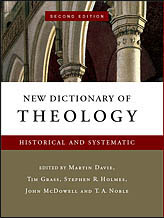The many “Dictionaries” IVP has released over the years have earned their place as standard “go-to” resources for many. The New Dictionary of Theology (1988; Sinclair Ferguson and David Wright, eds.) was their second, and it now has been thoroughly updated and expanded under new editorship. In the nearly thirty years since the first edition many new themes have demanded attention, and many new writers have risen to address them. This second edition therefore includes more than 400 new articles and many new writers. Additionally, many of the existing articles have been expanded and amended, and almost all have additional bibliographical references.
New articles in the New Dictionary of Theology include:
- African Theology
- Analytic Theology
- Arab Christian Thought
- Asian Christian Thought
- Black Theology
- Capitalism
- Chinese Theology
- Derrida
- Gender
- Islam and Christianity
- Japanese Christian Thought
- Jewish-Christian Relations
- Korean Theology
- Postliberalism
- Realism
- Syrian Christianity
- Yale School
- Zionism
Other new authors & topics of interest:
- Richard Bauckham on Hans Kung
- David Bebbington on History
- Colin Duriez on George MacDonald
- Samuel Escobar on Praxis and Orthopraxis
- J. Andrew Kirk on the Lausanne Covenant and Missiology
- Roger Lundin on Ralph Waldo Emerson
- I. Howard Marshall on C.H. Dodd
- Mark Noll on B.B. Warfield
- Oliver O’Donovan on Moral Theology
- Anthony Thiselton on Soren Kierkegaard and Paul Tillich
- Andrew Walls on Leslie Newbingin
- John Webster and Roland Chia on Hans Urs von Balthasar
- Kevin Vanhoozer on Love of God
The new subtitle announces its purview – Historical and Systematic Theology. With IVP’s 2000 New Dictionary of Biblical Theology now available, the material in the original NDT on biblical theology has been eliminated, making room for the expanded range of historical and systematic topics now addressed. The treatment of the topics, overall, seems decidedly more historical than systematic, however, with much more attention given to historical development of doctrinal themes than to systematic definition or exposition. Personally I found this disappointing, even though the historical treatments are consistently valuable. Particularly disappointing was the lack of definitiveness on certain important topics. The questions of the historicity of Adam and the legitimacy of annihilationism, for example, are left rather open. And although the doctrine of justification is given a valuable historical survey it has virtually no systematic or biblical presentation, and traditionalists (like me!) will not be happy with its downplaying of the differences between the church’s historic doctrine and the new perspectives. The article on creation seems to suggest that an openness to evolution is to be preferred. It was also surprising to find no separate articles on the gifts of tongues or prophecy, or on cessationism, topics so prominent in contemporary debate.
Some of these complaints are more serious than others, and of course editorial decisions must be made. But as important as some of these complaints may be the Dictionary’s value very obviously remains – with regard to many of the original articles that have been retained and new ones that have been added. Numerous biographical entries help fill the book’s 1000+ pages also. Overall the historical overviews provided for many of the topics seem to me to constitute the chief value of this outstanding volume. The more than 300 authors and more than 800 topics make the New Dictionary of Theology an important reference work that most students and pastors will want to own and keep handy.
Fred G. Zaspel
